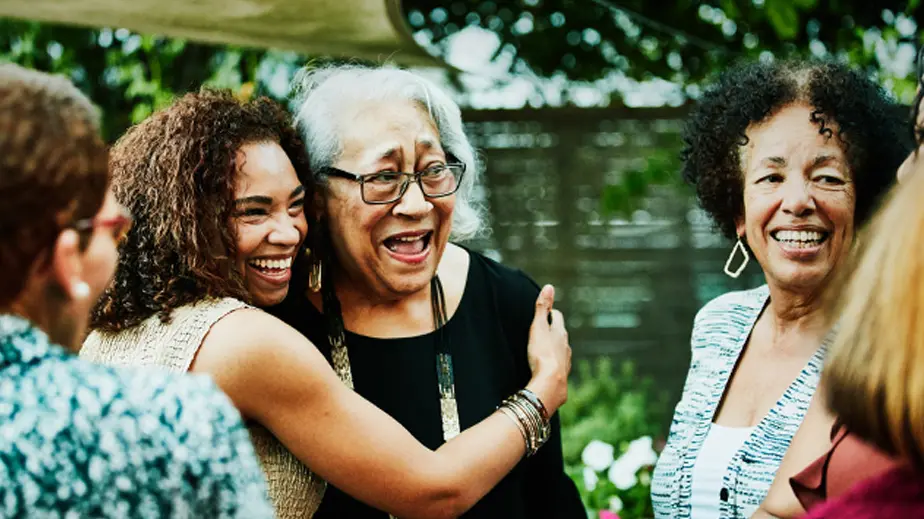How to practice social wellness
Learn how nurturing your relationships can optimize your well-being.
By Bernadette Mazurek Melnyk

(Photo from Getty Images)
Social well-being can be defined as our ability to effectively interact with people around us and create a support system that includes family and friends. It fosters connection with others and contributes to a sense of belonging, which is important for optimal wellness.
Just as some people are born with great physical health, others seem naturally fortunate to have a big family and many friends. However, social wellness is not merely having a big group of friends and family with whom to connect. It includes developing the skills that will help you to relate to others in a healthy and meaningful way. Conflict management, setting boundaries, communication skills, assertiveness, respect for others and the ability to balance your time between social and personal needs are all part of maintaining healthy relationships. In other words, there’s a great deal of social wellness that is learned behavior. We can all continually improve on these skills. If you’re feeling socially disconnected, there are ways to build your support network and foster social well-being.
How important is social wellness to our lives and overall health? Some see it as a life-giving connection. “We can’t underestimate the power that we have as individuals to provide the support that people need,” former U.S. Surgeon General Vivek Murthy said. Concerned about the opioid crisis, Murthy met with many affected people and was impressed by how often they stressed the importance of social connection. Many individuals in recovery told him they would not have made it without the support of others, even if just one person had given them support. Social support, Murthy says, can “provide that transition from a place of pain to a place of possibility.”
What is loneliness?
Social isolation, or being alone, doesn’t always equate with loneliness. Some people who are surrounded by family and friends feel lonely. Others who live and work alone don’t feel lonely at all. Psychology researchers Julianne Holt-Lunstad and Timothy B. Smith from Brigham Young University, who studied the links of loneliness and social isolation to cardiovascular disease, define loneliness as “the discrepancy between one’s desired and actual level of social connection.” That means that if being alone doesn’t bother us, we aren’t lonely. Only when we notice the lack of social connection do we feel the stress of loneliness. However, feelings of loneliness are very real. So are the health risks: Holt-Lundstad and Smith found that social isolation and loneliness increased risk of death by upwards of 30 percent — a greater risk than that of smoking or obesity.
While all of us feel lonely at times, this emotional state has been misunderstood in the past. Lonely people have been derided as anti-social loners lacking in social skills. Not wanting to be blamed for their loneliness, many people resist admitting to it, even to themselves. That’s dangerous, says social neuroscientist John Cacioppo ’75 MA, ’77 PhD. Brain image studies show loneliness puts the brain into a survival-mode state of hypervigilance. Negative effects include increased cortisol levels, impulsive responding and fitful sleep. Cacioppo urges people who feel isolated to respond as they would to hunger, thirst or pain — by answering the body’s message that something is needed.
Studies on the impact of loneliness on physical health are alarming. Loneliness has been linked to elevated stress hormones and inflammation, which can increase the risk of heart disease, arthritis, Type 2 diabetes and dementia, according to Assistant Professor Lisa Jaremka of the University of Delaware, who completed an Ohio State post-doctoral fellowship in 2014. Jaremka’s research also found that people who are lonely may experience immune dysregulation, both on a day-to-day basis and in response to acute stress. Another study found that loneliness was a risk factor for cognitive problems.
While the implications of loneliness are disheartening, you can improve your social wellness. Here are a few ways to improve your relationships with others and connect with new people:
Disconnect to connect.
Although technology has many positives, it also can be a barrier to connecting to others at home or work. Disconnect from technology as a daily routine to spend some time in face-to-face communication with people at home and work.
Improve your communication skills.
Communicate in person whenever possible. Learn to use “I” statements, such as, “I need to talk to you,” instead of “you” statements like, “You don’t listen.” Consider taking a class in communication skills if you believe yours need improvement.
Connect with your community.
Volunteering can give you a sense of self-worth and connect you to other people. Or, consider joining a local group focused on an activity you enjoy, such as singing or knitting, or one that you’d like to learn more about.
Be positive.
Other people will enjoy being with you, and you will enjoy yourself with a positive outlook. Put disappointments, complaints and worries aside for a while and enjoy the present.
Evaluate your emotional intelligence.
Are you sensitive to others’ emotions? If not, you may be missing signals they’re giving you about what they need from you as a friend or family member. Take an interpersonal skills test to find areas where you could improve.
Celebrate and compliment your family and friends.
Bolster relationships with a call or visit. Don’t wait for birthdays to celebrate. It’s always a good time to send a card or connect in person. Make a regular habit of complimenting and thanking people when it is deserved. How to Win Friends and Influence People by Dale Carnegie has some great suggestions.
Smile and learn people’s names.
There is great value in smiling and remembering people by their first name.
Improve time management.
When you arrive on time, you show that you respect and value others. Don’t keep people waiting.
Build a culture of respect.
When you model respect for others who may be different from you, you gain respect, too.
Make an action plan to connect to others.
Don’t just wait for it to happen — put it in your calendar. You can take charge of your social wellness.
Respect your partner.
Studies show that successful couples name respect as the most important part of their relationship, valuing it even higher than communication. If you’re married or in a committed relationship, show your partner loving respect.
Learn to argue in a positive, constructive way.
Psychologist John Gottman points out most couples argue from time to time, as do friends and co-workers, and that’s not necessarily bad — the important thing is to know the right way to argue. Relationships can thrive when people know how to successfully deal with conflict.

Ohio State neuropsychologist Jeremy Grant explains how activity, diet and sleep can slow decline and boost resilience.

Gus Smithhisler has carved for zoos, movies and video games—now he’s sharing tips to help your Block O pumpkin stand out.

Ohio State’s alumni association has stencils of Brutus, Script Ohio and a buckeye leaf. Click here to request the downloads.
